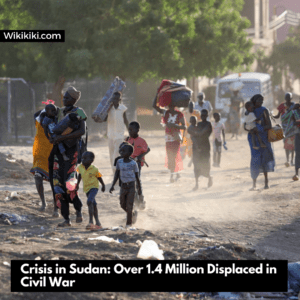Sudan, a nation located in Africa, is facing an unprecedented crisis as a civil war between rival factions has caused mass displacement and widespread suffering. Since the conflict erupted in mid-April, nearly 1.4 million people have been displaced, according to the United Nations Office for the Coordination of Humanitarian Affairs (OCHA). The scale of the catastrophe is alarming, with millions of people affected by the violence and its aftermath. In this article, we will delve into the causes, consequences, and efforts to address this humanitarian crisis.
Also Read: Cholera Outbreak in South Africa Claims 21 Lives

According to the United Nations Office for the Coordination of Humanitarian Affairs (OCHA), over 843,100 people have been internally displaced within Sudan since the conflict began. The states hosting the highest numbers of displaced people include White Nile, West Darfur, and River Nile. The capital, Khartoum, has seen a significant influx of internally displaced persons, with nearly 650,000 people seeking refuge there. Additionally, more than 248,000 individuals have fled to neighboring countries such as Central African Republic, Chad, Egypt, Ethiopia, and South Sudan.
The conflict in Sudan is primarily between the Sudanese Armed Forces (SAF) and the paramilitary Rapid Support Forces (RSF). The roots of the conflict can be traced back to political instability and power struggles within the country. General Abdel-Fattah Burhan leads the SAF, while General Mohammed Hamdan Dagalo commands the RSF. Differences between the two factions escalated in mid-April, leading to violent clashes and widespread destruction.
Also Read: WFP Appeals for $810 Million to Hunger Emergency in the Horn of Africa
Displacement Crisis
The displacement crisis in Sudan is staggering, with over 1 million internally displaced people (IDPs) within the country and more than 248,000 refugees seeking shelter in neighboring countries such as Central African Republic, Chad, Egypt, Ethiopia, and South Sudan, according to the UN Refugee Agency (UNHCR). The states hosting the highest numbers of newly displaced people are White Nile, West Darfur, and River Nile.
The humanitarian impact of the conflict is devastating. Millions of people lack access to basic health services, and attacks on healthcare facilities and personnel have been reported. At least 34 attacks on healthcare have occurred since the violence began, including those targeting hospitals, health facilities, and warehouses. These attacks hamper the ability of humanitarian organizations to provide crucial aid and exacerbate the suffering of the affected population.
Gender-based violence and sexual violence against women and girls have also been reported, further exacerbating the crisis. The UN Population Fund and the UN Special Representative of the Secretary-General on Sexual Violence in Conflict have raised concerns about the increasing incidents of gender-based violence and rape committed by the parties involved in the conflict.
The conflict has taken a toll on Sudan’s economy, exacerbating poverty and pushing many families to flee the country. The destruction of homes, schools, banks, and government institutions has disrupted basic services and created a sense of insecurity among the population. The lack of water, electricity, and telecommunication services further compounds the challenges faced by the displaced and vulnerable communities.
Also Read: Italy’s Worst Flooding in 100 Years, Atleast 15,000 People Displaced
Healthcare crisis
The conflict has severely impacted the healthcare system in Sudan, leaving millions of people without access to essential medical services. At least 34 attacks on healthcare facilities have been reported, including the destruction of hospitals and the targeting of healthcare personnel. The Committee of Sudan Doctor’s Trade Union reported that 67% of the main hospitals in conflict-affected areas were out of service, leaving only 29 hospitals partially functioning. The lack of medical facilities has resulted in increased fatalities and injuries, further exacerbating the humanitarian crisis.
International response
The international community must rally together to address the humanitarian crisis in Sudan. The United Nations and various humanitarian organizations are working diligently to provide aid and relief supplies to the affected areas. However, insecurity and transportation challenges hinder their efforts. Urgent financial support is needed to ensure the timely delivery of essential supplies and the restoration of critical infrastructure.
The African Union’s Peace and Security Council has adopted a roadmap for the resolution of the conflict in Sudan. The roadmap emphasizes the need for a coordinated and inclusive process that guarantees a permanent cessation of hostilities, enables access to humanitarian assistance, protects civilians and infrastructure, and fosters a credible and inclusive political transition towards a democratic civilian-led government. The involvement of neighboring states and regional actors is crucial to finding a sustainable and African-led solution to the crisis.
In Conclusion, the humanitarian crisis in Sudan demands immediate attention and intervention from the international community. The displacement of 1.4 million people, coupled with the destruction of healthcare facilities, the prevalence of gender-based violence, and the economic challenges faced by the Sudanese population, requires urgent support. It is essential for nations and organizations worldwide to provide financial aid, resources, and expertise to address the immediate needs of the affected population and work towards a long-term solution for peace and stability in Sudan.
Also Read: The Impact of Rising Ocean Temperatures on Marine Life

















+ There are no comments
Add yours